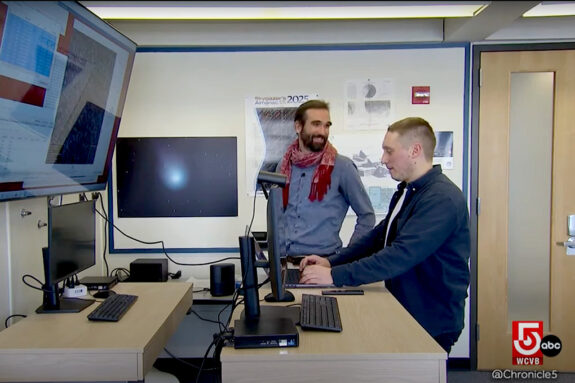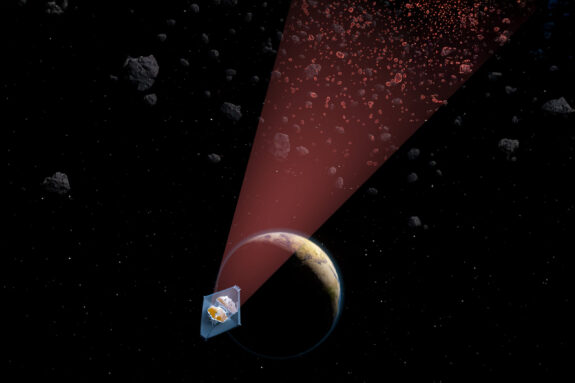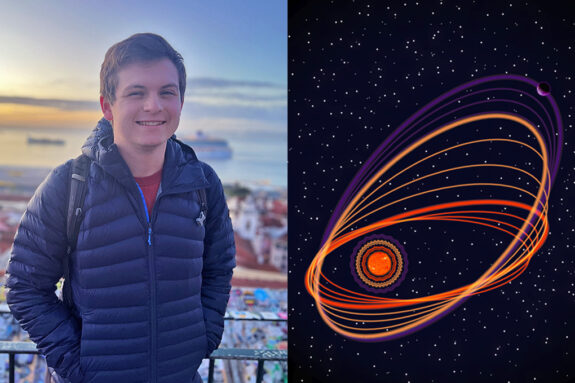
Planetary scientist specializing in the detection and characterization of new worlds, in particular exoplanets and their atmospheres.
Research Interests
My group works on discovering and studying new worlds to consolidate our understanding of planets and habitats. My primary interest and expertise lie in the field of data science where math and science are brought together to make sense of newly accessible pieces of reality! I have developed and applied new analysis techniques to map exoplanet atmospheres, study the radiative and tidal planet-star interactions in eccentric planetary systems, and constrain the atmospheric properties and mass of exoplanets solely from transmission spectroscopy.
We aim to:
DISCOVER exoplanets with the TRAPPIST and SPECULOOS telescopes, and NASA’s Transiting Exoplanet Survey Satellite (TESS) and the Galactic Plane Exoplanet Survey (GPX).
CHARACTERIZE objects of astronomical interest for potential further detailed study by the NASA Hubble, Spitzer, and James Webb space telescopes.
CONTEXTUALIZE the properties of individual astronomical bodies to understand their physical processes.
Topics I investigate:
- Transit photometry and transmission spectroscopy
- Exoplanetary atmospheres and atmospheric characterization
- Habitability
- Radiative and tidal planet-star interactions
- Eccentric planetary systems
- GPU applications in mining observation data, especially for minor solar system bodies
- Theoretical works aimed at supporting our community’s best use of large, next-generation space-based telescopes like the JWST
Biographic Sketch
Julien de Wit joined the EAPS faculty in 2018. De Wit holds a bachelor’s degree in physics and mechanics (2008) and a master’s in aerospace engineering (2011) from the Université de Liège, as well as having completed master’s studies at the Institut Supérieur de l’Aéronautique et de l’Espace in astrophysics, planetology and space systems science. He then moved to EAPS at MIT to pursue his PhD and postdoctoral studies. In 2017, de Wit was part of an international team including astronomers from MIT and the University of Liège in Belgium that announced the record-breaking discovery of seven rocky, Earth-sized planets orbiting in the habitable zone of TRAPPIST-1, an ultracool dwarf star just 39 light years from Earth, discovered with a network of small, 1-meter ground-based telescopes in the Andean high desert. Since then, de Wit has spearheaded the expansion of the SPECULOOS telescope network into the northern hemisphere with the installation of MIT’s Artemis at the Teide Observatory on Tenerife.
Key Awards & Honors
- 2018 • NASA Group Achievement Award – Elected recipient for the TRAPPIST-1 Team
- 2017 • Pioneer of the Year – Europe (Innovators Under 35)
- 2017 • Honorary Citizenship from the city of Liège
- 2014 • Early Career Award from the Association of the Engineers of Liège
- 2011 • Odissea Award of the Belgian Senate
Key Publications
-
Berardo, D., De Wit, J., & Rackham, B. V. (2024). Empirically Constraining the Spectra of Stellar Surface Features Using Time-resolved Spectroscopy. The Astrophysical Journal Letters, 961(1), L18. doi: 10.3847/2041-8213/ad1b5b
-
Triaud, A.H.M.J., de Wit, J., Klein, F. et al. (2024) Atmospheric carbon depletion as a tracer of water oceans and biomass on temperate terrestrial exoplanets. Nat Astron 8, 17–29 . doi: 10.1038/s41550-023-02157-9
-
Niraula, P., de Wit, J., Gordon, I.E. et al. The impending opacity challenge in exoplanet atmospheric characterization. Nat Astron 6, 1287–1295 (2022). doi: 10.1038/s41550-022-01773-1


